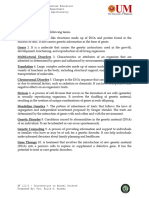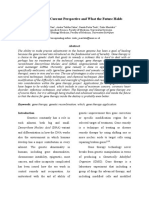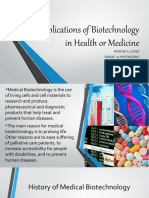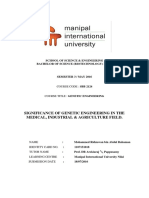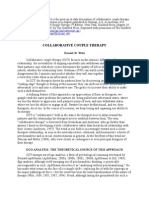Chapter 11 Sts
Chapter 11 Sts
Uploaded by
Cute kittyCopyright:
Available Formats
Chapter 11 Sts
Chapter 11 Sts
Uploaded by
Cute kittyOriginal Description:
Original Title
Copyright
Available Formats
Share this document
Did you find this document useful?
Is this content inappropriate?
Copyright:
Available Formats
Chapter 11 Sts
Chapter 11 Sts
Uploaded by
Cute kittyCopyright:
Available Formats
CHAPTER
GENE THERAPY
11 (Stem Cells)
OBJECTIVES
After studying the chapter, the students shall be able to:
1. Describe the gene therapy and its various forms
2. Assess the issue’s potential benefits and detriments to global health
PRESENTATION OF CONTENTS
Gene Therapy
Gene therapy is the method of inserting genes or nucleic acid into cells as a drug to
treat genetic diseases. In 1972, Theodore Friedman and Richard Roblin proposed that
people with genetic disorders can be treated by replacing defective DNA with good DNA.
Figure 17. Gene Augmentation Therapy
In 1985, Dr. W. French Anderson and Dr. Michael Blasse worked together to show
that cells of patients with Adenosine deaminase (ADA) deficiency can be corrected in tissue
culture. In 1990, the first approved gene therapy clinical research took place at the National
Institute of Health (NIH) under the team of Dr. Anderson. It was conducted on a four-year-old
girl who had ADA deficiency. In 1993, the first somatic treatment that produced a permanent
genetic change was performed.
The first commercial gene therapy product Gendicine was approved in China in 2003
for the treatment of certain cancers. Due to some clinical successes since 2006, gene
therapy gained greater attention from researchers but was still considered as an
experimental technique.
Science, Technology and Society | 1
In 2016, the Committee for Medical Products for Human Use (CHMP) of the
European Medicines Agency (EMA) endorsed the gene therapy treatment called Strimvelis
that was approved by the European Commission in June 2018.
Some studies transplanted genes to speed up the destruction of cancer cells. Gene
or cell therapies have emerged as realistic prospects for the treatment of cancer, and involve
the delivery of genetic information to a tumor to facilitate the production of therapeutic
proteins. This area of gene therapy still needs further studies before an efficient and safe
gene therapy procedure is adopted (Gene Revolution: Issues and Impacts, n.d., Wirth et al.,
2013).
Ethnical Issues in Genetic Engineering
Various concerns on genetic engineering arise, making gene therapy and GMOs very
controversial innovations in science and technology. Others support that it is unethical for
humans to have a hand in genetically altering and engineering organisms. There are
instances when genetic engineering has caused severe repercussions to public health. Until
today, cloning is still unacceptable to many for it violates the belief that only a higher being
should be responsible for the existence of organisms on earth. There are also ethical and
normal issues on stem cell therapy as it makes use of stem cells sourced from human
embryos and thus destroy them. These concerns regarding genetic engineering and gene
therapy are rooted in the question of whether or not humans are playing gods in the
alteration of genes of organisms.
Genetic engineering also poses problems in agriculture. Hence, there is a need to
study the ecological processes applied to agricultural production systems. Agroecology is a
field of study that presents novel management approaches on farming systems that may
help address concerns regarding the effect of GMOs on biodiversity and the health of the
consumers. Further researches as well as clinical experiments to outline functional
mechanisms, predictive approaches, patient-related studies, and upcoming challenges
should be done to address existing problems in the development of and to acquire future
perspectives in gene therapy.
Science, Technology and Society | 2
ACTIVITY 11
Name: __________________________________ Date: _________________
Course/Yr./Block: ________________________ Score: ________________
PROS AND CONS
Direction: Complete the table below regarding on the effects of gene therapy to health and to
the society.
PROS CONS
Human health
Society
1. What do you think about gene therapy?
2. Do you think the Food and Drug Administration should or should not approve gene
therapy treatments for use in the Philippines?
3. Do you think the government should or should not fund scientific researches on changing
the genes of unborn babies that aims to improve their characteristics such as intelligence or
physical traits such as athletic ability or appearance
Science, Technology and Society | 3
You might also like
- Ohio Nurse Practice ActDocument10 pagesOhio Nurse Practice Actapi-158363275No ratings yet
- Bizmanualz Medical Office Policies and Procedures SampleDocument7 pagesBizmanualz Medical Office Policies and Procedures SampleYe Phone0% (1)
- Lesson 13 The Aspect of Gene TherapyDocument3 pagesLesson 13 The Aspect of Gene TherapyJamesMarniel AludoNo ratings yet
- Emerging Trends and Challenges in BiologyDocument6 pagesEmerging Trends and Challenges in BiologyBryan MasikaNo ratings yet
- The Ethics of Gene EditingDocument4 pagesThe Ethics of Gene Editingseanrhee2024No ratings yet
- CLIEFORDDocument49 pagesCLIEFORDKristine Abe GailNo ratings yet
- RRL Raw VersionDocument11 pagesRRL Raw Versionalayanjoshua26No ratings yet
- Pharmacology of Gene Therapy - A New Era in MedicinDocument10 pagesPharmacology of Gene Therapy - A New Era in Medicinhanan SindiNo ratings yet
- 1 Gene TherapyDocument6 pages1 Gene Therapysarah.sardonNo ratings yet
- Buelis Chapter 9Document5 pagesBuelis Chapter 9Jay BuelisNo ratings yet
- Biotech PaperDocument3 pagesBiotech Paperelvilamaj6No ratings yet
- New Trends in BiologyDocument5 pagesNew Trends in BiologyGeorgina Osorio HegelNo ratings yet
- (M8-MAIN) The Microscopic WorldDocument45 pages(M8-MAIN) The Microscopic WorldCEDRICK NICOLAS CUGAS VALERANo ratings yet
- gene therapyDocument14 pagesgene therapy7v5fs29t9sNo ratings yet
- Biology Assignment SUJANDocument19 pagesBiology Assignment SUJANsudhansu.champati80No ratings yet
- Research PaperDocument8 pagesResearch Paperapi-512310570No ratings yet
- What Is Gene TherapyDocument6 pagesWhat Is Gene TherapySharuq Hussain100% (1)
- Gene Therapy InfoDocument3 pagesGene Therapy InfoShailendra Singh KhichiNo ratings yet
- Gene Editing Discussion PaperDocument3 pagesGene Editing Discussion PaperRespaldo - JesNo ratings yet
- Module 12 - The Aspect of Gene TherapyDocument4 pagesModule 12 - The Aspect of Gene TherapyMark Daniel DeTorres GolisaoNo ratings yet
- Sabale Article 4Document5 pagesSabale Article 4Aman TipleNo ratings yet
- EPIGENETICSDocument4 pagesEPIGENETICSSandra Alonso100% (1)
- Genetic technol-WPS OfficeDocument10 pagesGenetic technol-WPS Officentegefrank184No ratings yet
- Gene Therapy: Current Perspective and What The Future HoldsDocument10 pagesGene Therapy: Current Perspective and What The Future HoldskepegawaianNo ratings yet
- Genetic EngineeringDocument7 pagesGenetic Engineeringcristina maquintoNo ratings yet
- Jed120070 923 924Document2 pagesJed120070 923 924LyinglionNo ratings yet
- AMANDA EDMAR - Terapia GnicDocument14 pagesAMANDA EDMAR - Terapia GnicVERONICA MOREIRA FERREIRANo ratings yet
- Gene TherapyDocument26 pagesGene Therapydeseseamor829No ratings yet
- Applications of Biotechnology in Health or Medicine: MJ Rose A. Lopez Grade: 11 PhytagorasDocument12 pagesApplications of Biotechnology in Health or Medicine: MJ Rose A. Lopez Grade: 11 PhytagorasMJ Rose LopezNo ratings yet
- SEMI-FINALS Lesson 3: Gene Therapy Intended Learning OutcomesDocument3 pagesSEMI-FINALS Lesson 3: Gene Therapy Intended Learning OutcomesWild RiftNo ratings yet
- Bio InvestigatoryDocument29 pagesBio InvestigatoryNysa Hajira100% (1)
- Gene TherapyDocument36 pagesGene TherapyMarienne Sophia CabalNo ratings yet
- Sts Module 8Document5 pagesSts Module 8RONYL JHON PENUSNo ratings yet
- Research EssayDocument9 pagesResearch Essayapi-460097393No ratings yet
- Gene Therapy.stsDocument2 pagesGene Therapy.stsdelarosarandel541No ratings yet
- Genetic EngineeringDocument9 pagesGenetic EngineeringChoco RatNo ratings yet
- slidesgo--20241018181600EqUNDocument16 pagesslidesgo--20241018181600EqUNFE DEVIL YTNo ratings yet
- Decision Making in Differences of Sex DevelopmentDocument3 pagesDecision Making in Differences of Sex DevelopmentHamad ShahNo ratings yet
- STS Act20-Genetherapy NosquialDocument3 pagesSTS Act20-Genetherapy NosquialMark Dionel NosquialNo ratings yet
- Gene TherapyDocument29 pagesGene Therapysneha26duttaNo ratings yet
- Gene TherapyDocument5 pagesGene TherapyJamesel VillaruzNo ratings yet
- Gene TheraphyDocument11 pagesGene TheraphycesureportNo ratings yet
- Medicine Advancs in Biotechnology 2.0.Document21 pagesMedicine Advancs in Biotechnology 2.0.moharanasubham47No ratings yet
- 1 Slide: Chapter 11: Gene TherapyDocument6 pages1 Slide: Chapter 11: Gene TherapyPailago Kate Jan QueenNo ratings yet
- Let's Analyze-10Document1 pageLet's Analyze-10Melchie Iligan TomanggongNo ratings yet
- Lesson 4 - Gene TherapyDocument6 pagesLesson 4 - Gene TherapyKaneki kenNo ratings yet
- Genetic Modification in HumansDocument2 pagesGenetic Modification in HumansLauraNo ratings yet
- SBB 2124Document13 pagesSBB 2124Mohammed RidzuwanNo ratings yet
- The Clinical Application of Gene Editing: Ethical and Social IssuesDocument14 pagesThe Clinical Application of Gene Editing: Ethical and Social IssuesSAMUEL ESCARESNo ratings yet
- STS Module 2023 2024 94 97Document4 pagesSTS Module 2023 2024 94 97Delia TadiaqueNo ratings yet
- Evidence 1 STDocument7 pagesEvidence 1 STTania FigueroaNo ratings yet
- Biology Project File: Milton Public SchoolDocument20 pagesBiology Project File: Milton Public SchoolAmit SinghNo ratings yet
- Gene Therapy Julie C. Casper Usha Palaniswamy Introduction To Biology March 3, 2014Document8 pagesGene Therapy Julie C. Casper Usha Palaniswamy Introduction To Biology March 3, 2014Julie Crumpler CasperNo ratings yet
- Biology Re ProjectDocument13 pagesBiology Re Projectmokshit780No ratings yet
- Gene TherapyDocument10 pagesGene TherapyjustinerenzebonballadosNo ratings yet
- TP1-232464Document7 pagesTP1-232464Cheuk Lam ChanNo ratings yet
- Biotechnology and Gene TherapyDocument20 pagesBiotechnology and Gene TherapyKrizzy PatenioNo ratings yet
- STS Synthesis PaperDocument6 pagesSTS Synthesis PaperMaviiiNo ratings yet
- SDOM Promising TherapiesDocument16 pagesSDOM Promising TherapiesdarlingcarvajalduqueNo ratings yet
- Public Perception of Biotechnology:: Genetic Engineering - Safety, Social, Moral and Ethical ConsiderationsDocument18 pagesPublic Perception of Biotechnology:: Genetic Engineering - Safety, Social, Moral and Ethical ConsiderationsHayderNo ratings yet
- Chapter 7 StsDocument4 pagesChapter 7 StsCute kittyNo ratings yet
- Chapter 13 STSDocument5 pagesChapter 13 STSCute kittyNo ratings yet
- MMW - Chapter 1Document26 pagesMMW - Chapter 1Cute kittyNo ratings yet
- Chapter 10 StsDocument6 pagesChapter 10 StsCute kittyNo ratings yet
- Ncma 219 Rle ReviewerDocument7 pagesNcma 219 Rle ReviewerAngelica AdlawanNo ratings yet
- XXX ConclusionDocument2 pagesXXX ConclusionCardenas IgnacioNo ratings yet
- Mckenna Rausch DH ResumeDocument2 pagesMckenna Rausch DH Resumeapi-398891904No ratings yet
- Appendicitis Preoperative Care 1Document3 pagesAppendicitis Preoperative Care 1لوريس أبو الفتوحNo ratings yet
- Stress and Worker Well-BeingDocument31 pagesStress and Worker Well-BeingZefanya TarlimanNo ratings yet
- Drug Study Cefazolin Module 13Document1 pageDrug Study Cefazolin Module 13Daryl Joy Cortez100% (1)
- Bill Starr WorkoutsDocument3 pagesBill Starr WorkoutsJamab Adfk100% (1)
- The Abused and The Abuser Victim Perpetrator DynamicsDocument11 pagesThe Abused and The Abuser Victim Perpetrator DynamicsAlina PopescuNo ratings yet
- CPP2 Lab 1Document4 pagesCPP2 Lab 1Dinyashier SakkamNo ratings yet
- P660 - Lecture 7 - Structural Family TherapyDocument7 pagesP660 - Lecture 7 - Structural Family TherapySiti Nurhidayatul Akmar EsbahNo ratings yet
- EMQs For Medical Students Volume 3 2eDocument16 pagesEMQs For Medical Students Volume 3 2ePasTestBooks50% (2)
- Anwers For NCM 105 TEST QUESTIONS ON MOOD DISORDERS PDFDocument5 pagesAnwers For NCM 105 TEST QUESTIONS ON MOOD DISORDERS PDFDa Bondad100% (2)
- Guide To Social Security Organization MalaysiaDocument18 pagesGuide To Social Security Organization MalaysiaMuhammad Hazlami MerahNo ratings yet
- Institutional Learning Plan: ' Oxford Louise Academy of Dasma., IncDocument5 pagesInstitutional Learning Plan: ' Oxford Louise Academy of Dasma., IncBong ReloxNo ratings yet
- Magnet Therapy: Dominika Dakinevičiūtė Faculty of Medicine 2019Document12 pagesMagnet Therapy: Dominika Dakinevičiūtė Faculty of Medicine 2019Dominika DakinevičiūtėNo ratings yet
- BIOFEEDBACKDocument18 pagesBIOFEEDBACKnkarthikrajNo ratings yet
- Article Review: Effects of Motor Control Intervention For Children With Idiopathic Toe Walking A 5-Case SeriesDocument6 pagesArticle Review: Effects of Motor Control Intervention For Children With Idiopathic Toe Walking A 5-Case Seriesapi-437579860No ratings yet
- Lisa Zanyk Continuing EducationDocument3 pagesLisa Zanyk Continuing Educationapi-248304602No ratings yet
- Chicago Special Parent 2012Document56 pagesChicago Special Parent 2012Chicago ParentNo ratings yet
- Specification For Protein-Rich Food Supplements For Infants and Preschool ChildrenDocument18 pagesSpecification For Protein-Rich Food Supplements For Infants and Preschool ChildrenSatish VaidyaNo ratings yet
- 2004 PublicationsDocument89 pages2004 PublicationsMochamad Hasim AsariNo ratings yet
- NCP - OsteoporosisDocument4 pagesNCP - OsteoporosisCassey CuregNo ratings yet
- Collaborative Couple Therapy: Page Pr/gurman3.htm&dir Pp/fac&cart - IdDocument39 pagesCollaborative Couple Therapy: Page Pr/gurman3.htm&dir Pp/fac&cart - IdCarlos InfanteNo ratings yet
- Evaluation Tests For Secondary Hemostasis (Lab Analysis) HematologyDocument5 pagesEvaluation Tests For Secondary Hemostasis (Lab Analysis) HematologyAudreySlitNo ratings yet
- Argumentative Research Paper Rough DraftDocument4 pagesArgumentative Research Paper Rough Draftapi-2062547110% (1)
- Supratec MBR-600Document4 pagesSupratec MBR-600unconformistNo ratings yet
- ASSISTING IV INSERTION V 2Document2 pagesASSISTING IV INSERTION V 2Kim XiaoNo ratings yet
- Ethics in Healthcare Case ScenariosDocument1 pageEthics in Healthcare Case ScenariosA CNo ratings yet









